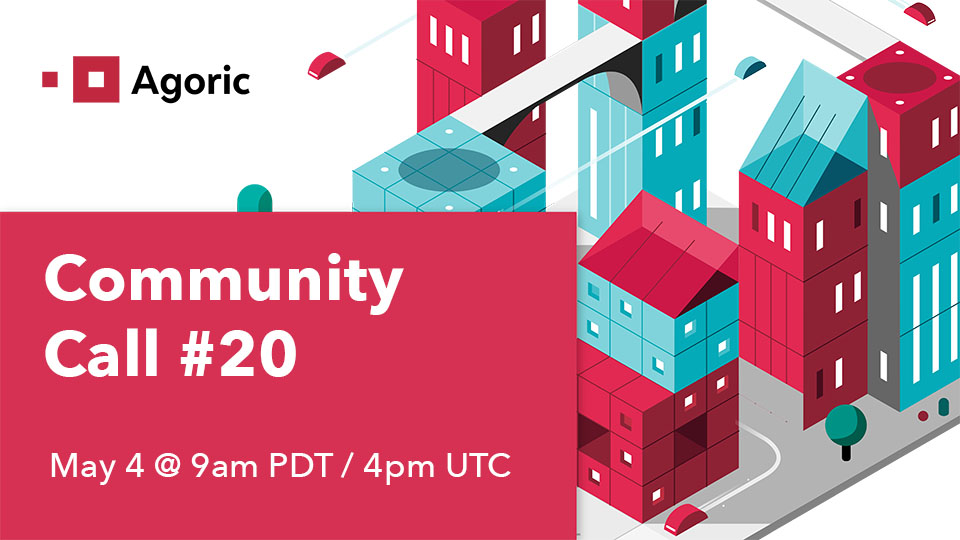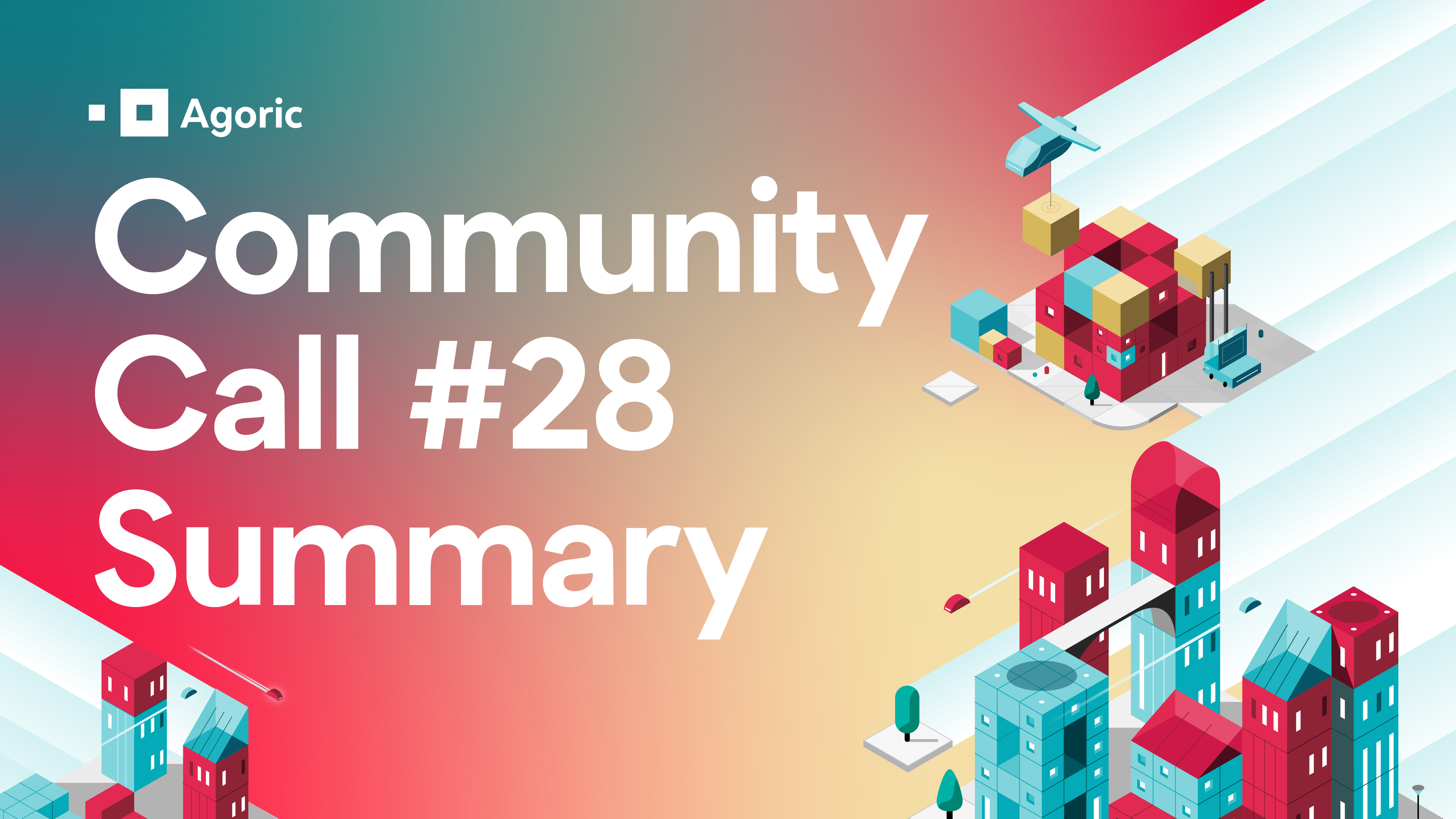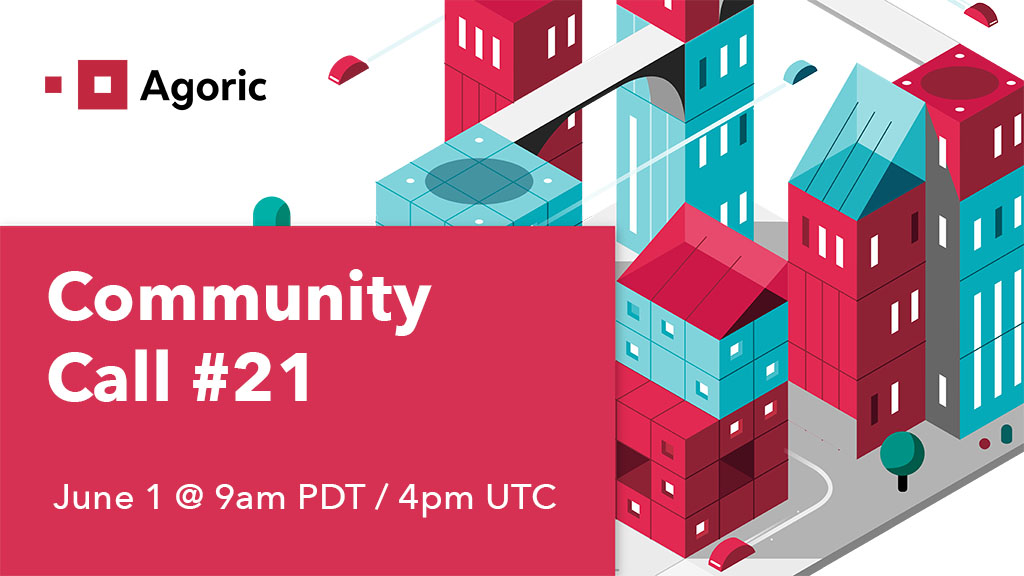The Agoric monthly community call is a chance to discuss community updates, answer questions, and share thoughts and ideas. The May call was another very insightful conversation that covered important topics, including The BLD Staking Month, DCF Policy Proposal, Gateway Prague Conference, and Inter Protocol Introduction.
This post is intended as a summary of key items from the May 4 event. Speakers included Agoric Dean Tribble, CEO; Rowland Graus, Director of Product Management; Jessy Irwin, Director of Security; Vanessa Pestritto, Director of Partner Programs; Santiago Semino, Director of Marketing — plus Ric Shreves of the Decentralized Cooperation Foundation (dcfoundation.io).
Join us @agoric for our next Community Call on June 1 at 9am PT / 4pm UTC.
Gateway Prague Conference
Along with Juno and other Cosmo ecosystem projects, Agoric is co-sponsoring the Gateway conference, which will include a hackathon. The conference runs from May 16th to 17th in Prague, the event is developer-focused, and it’s an exciting opportunity for us at Agoric to meet more members of the Cosmos community and maybe some familiar faces too.
We will be running technical workshops with the RBF labs of Rockaway. Along with BytePitch and Cryo, who will also be providing workshops. This is one of those events you wouldn’t want to miss! A lot of the community members will be there.
The Prague event is where you’d meet the Cosmos Founders, the builders, ecosystem participants, and traders.
DCF First Steps
The Decentralized Cooperation Foundation, known as the DCF, exists to build mechanisms for human cooperation from tools of secure computing, cryptography, and distributed systems. Since its founding, DCF emphasized Agoric’s proof-of-stake chain and the Cosmos IBC environment. Engagement with — along with the acceleration of — these ecosystems is DCF’s purpose. They’ve been supportive of the Agoric initiative and provided support as we grow and scale our ecosystem.
DCF launched the dcfoundation.io website to post policy documents, share DCF’s mission, and help educate the community on what they can expect from DCF.
DCF’s Twitter account is now up and running, with the handle @DCF_io. You can follow the Twitter handle to get more news about upcoming DCF initiatives. They will be sponsoring an infrastructure award at Gateway Prague; they will also be visible in some other activities around the community across the upcoming weeks.
As DCF grows it will be built on community consensus. The Decentralized Cooperation Foundation is one of its kind. We’ve seen many foundations focused solely on one project or on the purpose of trying to promote a specific platform and the ecosystem that surrounds it. The DCF is taking a broader view and looking at the promise of decentralization and how it can advance cooperation and improve technology, governance, the way people use technology, and much more.
The community will be delighted to know the DCF will continue to support Agoric Staking Month initiatives. In addition, they announced the foundation’s proposed delegation policy on the call. The foundation holds about a hundred million BLD, which amounts to roughly 10%; they intend to delegate at least 50% of their build token. You can check their Twitter page and DCF website for the delegation terms and eligibility requirements.
The DCF aims to develop something that builds resilience, rewards diversity, and thus makes a more robust network.
BLD Staking Month
Last month’s 30-day awareness and education period was developed to help our community understand why and how to stake their BLD tokens. With the support of some incredible validator service providers and individuals in the community, the importance of staking and delegating was discussed. The staking initiative started on April 1st and ran through the end of the month.
For better staking knowledge, visit stake.agoric.com. There are several articles from validators who have participated in our incentivized testnet, and also new articles from the team. You can also listen to the Twitter Spaces recordings with some of our validators who shared their insights on all things staking — from taking part in governance to choosing validators to stake with and how to differentiate between validators.
The activities of Staking Month will continue past April, as we believe it’s a fantastic opportunity for the community to learn and improve decentralization of the network. Another great thing that happened during Staking Month was a community effort to organize a staking Telegram group. You can join the telegram channel at agoric_staking.
Staking contributes to the security and efficiency of the platform and also supports the ability to process transactions. Staking is important as it allows you to vote and use your right to take part in governance, it’s essential for a proof of stake chain, and it also ensures you have access to your keys.
Introducing Inter Protocol
We are planning on changing the branding of Run Protocol to Inter Protocol. Our goal is for Inter Protocol to be the Primary Interchange Stable Token. This better reflects the ability to grow from a small stable token to billions outstanding and still have a strong brand.
The rebrand will come with new designs, a new website, Twitter account, and more. Inter Protocol will be launched as part of mainnet-1. A whitepaper will also be available on agoric.com/economy once it’s ready.
In April we got a preview of the Inter Protocol live on Devnet. We were able to shuffle through two primary efforts, making sure the contracts are complete to the extent we want them to be for the preview and then deployed. These contracts are deployed on-chain, and we’ve run through the governance action that needs to happen as part of the mainnet-1 launch.
The launch will involve several elements:
We must make sure we can launch the vault system for Inter Protocol and then enable oracles.
We must make sure all connections are accurate.
We must make sure that the economic committee which can make decisions to change interest rates gets elected in the right way.
A major update was done to the liquidation mechanisms for vault, making the latest mechanism a lot smarter relative to market conditions. We also worked through an initial version of the UI for what was formerly known as Run-Stake and it will be renamed because the new token symbol is IST. We are working with an external design firm to build out a better UX and design for our production application that started in April.
Security Updates
We maintain an agoric.com/security webpage. It covers such material as our bug bounty program on H1, and the coordinated vulnerability disclosure policy (what to expect if you report a bug). Coming soon are five additional security reports (Zoe + ERTP, XS, Swingset, Restival, Zestival), and security documentation (threat models, known issues, advisories).
We completed the third-party vulnerability assessment of Swingset, with a strong vote of confidence in the architecture of the kernel. Inter Protocol audit is up next.
We finally got our Fuzzilli environment up and running. That’s Google Project Zero’s automated testing tool. The Moddable team have been amazing partners in fine-tuning Fuzzilli to support our efforts to strengthen XS memory safety. If you’re a bug hunter, take a look at XS.
Updated on our Econ Stress Test, a “Platinum Team” effort to examine economic resilience with academics and subject matter experts. We developed a Kubernetes-powered loadgen tool to simulate real-world interactions with the Inter Protocol and AMM. We’ll put it to use with intelligent agents we have used in econ modeling in a devnet environment. If you’re building monitoring/network viz tools, tune in on devnet in a few weeks!
Regarding validator security, in advance of MN-1, we will need a process for emergency security coordination. We’re drafting recommendations in the form of a runbook based on experience of coordinating with validators. The first stage will be Cosmos sec vulnerability. We would love to connect with validators to figure out how we get this right – everyone is part of our security team. Join in on the validator channels in Discord.
Community Updates
There are Telegram channels for Russian, Turkish, Hindi, English (Singapore), Vietnamese, French, Chinese, Hindi & Spanish. If you’re looking to run a language-specific Telegram, let us know on Telegram or Discord.
BLD Distribution / Public Sale
CoinList purchasers that did not submit addresses in time should keep an eye out for notice from CoinList to get into their second round of distribution.


